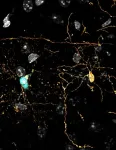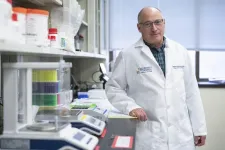(Press-News.org) Boredom is more common at work than in any other setting, studies show, and employees are bored at work for more than 10 hours per week on average.
Even astronauts and police officers get bored on the job. No occupation is immune.
Boredom serves an important purpose — it signals the need to stop an action and find an alternative project. But boredom becomes problematic when it’s ignored.
New research from the University of Notre Dame shows that trying to stifle boredom prolongs its effects and that alternating boring and meaningful tasks helps to prevent the effects of one boring task from spilling over to reduce productivity on others.
“Breaking Boredom: Interrupting the Residual Effect of State Boredom on Future Productivity,” forthcoming in the Journal of Applied Psychology from lead author Casher Belinda, assistant professor of management at Notre Dame’s Mendoza College of Business, along with Shimul Melwani from the University of North Carolina and Chaitali Kapadia from Florida International University.
The team sought to understand if, when and why experiencing boredom now might lead to attention and productivity deficits later. They tested these possibilities in three studies that examined the consequences of boredom on a task-to-task basis.
The first study drew on data from dual-career families working in a variety of industries. Participants responded to multiple surveys per day at different intervals, enabling the team to examine the relationships between boredom, attention and productivity over time. Follow-up studies used alternative methods to reach a broader audience and focused on how meaningful work tasks help mitigate boredom’s prolonged effects.
Belinda, who specializes in emotions, interpersonal communication and close relationships within organizations, noted that boredom is viewed as a nuisance emotion that any strong-willed employee should subdue for the sake of productivity.
He found that experiencing boredom at any one point in time leads to delayed or residual bouts of mind-wandering. Employees often try to “power through” boring tasks to make progress on their work goals, but he said that not only does this fail to prevent boredom’s negative effects, it’s also one of the most dysfunctional responses to boredom.
“Like whack-a-mole, downplaying boredom on one task results in attention and productivity deficits that bubble up during subsequent tasks,” he said. “Paradoxically, then, trying to suppress boredom gives its harmful effects a longer shelf life.”
Part of the solution lies in how work tasks are organized throughout the day. Although boring tasks can’t be avoided, effectively combating the negative effects of boredom requires careful consideration of the nature of different work tasks and how they are sequenced. Casher said it helps to work strategically, looking beyond a single boring task.
“‘Playing the long game’ will help minimize the cumulative effects of boredom over the course of the day,” Belinda explained. “Following an initial boring task, employees should turn to other meaningful tasks to help restore lost energy.”
Contact: Casher Belinda, 574-621-9629, cbelinda@nd.edu
END
Suppressing boredom at work hurts future productivity, study shows
2024-03-28
ELSE PRESS RELEASES FROM THIS DATE:
Older brain cells linger unexpectedly before their death
2024-03-28
For oligodendrocytes—the central nervous system cells critical for brain function—age may not bring wisdom, but it does come with the power to cling to life for much, much longer than scientists knew. That's according to a new study featured on the March 27 cover of the Journal of Neuroscience.
Mature oligodendrocytes took a shocking 45 days to die following a fatal trauma that killed younger cells within the expected 24 hours, Dartmouth researchers report. The findings suggest there's a new pathway for efforts to reverse or prevent the damage that aging and diseases such as multiple sclerosis cause to these important cells.
In the brain, ...
Clear shift in arterial diseases in diabetes
2024-03-28
There has been a redistribution in the risk of arterial disease in type 1 and 2 diabetes. The risks of heart attack and stroke have decreased significantly, while complications in more peripheral vessels have increased in relative importance, according to studies at the University of Gothenburg.
It is well known that type 1 and 2 diabetes increase the risk of heart attack and stroke. Previous research has also identified the clearest cardiometabolic risk factors in this context, such as obesity, lipid disorders, and high blood pressure.
How diabetes and cardiometabolic risk factors affect blood ...
Celebrating half a century of pioneering excellence: EBMT marks its 50th anniversary
2024-03-28
Barcelona, 27 March 2024 – The EBMT proudly commemorates its 50th anniversary, marking five decades of transformative advancements in the field of hematopoietic cell transplantation (HCT) and cellular therapy. More than 5,000 healthcare professionals will gather from the 14th to the 17th of April, 2024, at the Scottish Event Campus in Glasgow for this special edition and they will immerse themselves in cutting-edge scientific content, network with their peers from across the globe, and be part of a community that is driving innovation and change.
In 1974, a small group ...
Ancient DNA reveals the appearance of a 6th century Chinese emperor
2024-03-28
What did an ancient Chinese emperor from 1,500 years ago look like? A team of researchers reconstructed the face of Chinese Emperor Wu of Northern Zhou using DNA extracted from his remains. The study, published March 28 in the journal Current Biology, suggests the emperor’s death at the age of 36 might be linked to a stroke. It also sheds light on the origin and migration patterns of a nomadic empire that once ruled parts of northeastern Asia.
Emperor Wu was a ruler of the Northern Zhou dynasty in ancient China. Under his reign from AD 560 to AD 578, Emperor Wu built a strong military and unified the northern part ...
DNA study IDs descendants of George Washington from unmarked remains, findings to aid service member IDs going back to World War II
2024-03-28
New DNA sequencing technologies have identified the historical remains of George Washington’s grandnephews, Samuel Walter Washington and George Steptoe Washington Jr., and their mother, Lucy Payne Washington, from unmarked, fragmentary bones left at the Harewood family cemetery in Charles Town, West Virginia, in the mid-1800s.
In addition to enabling the remains in question to be reunited and reburied if desired, the researchers plan to apply the validated DNA analysis techniques to their ongoing efforts to identify the remains of service members lost around the world in past conflicts going back to World War II. The findings appear March 28 in the journal iScience.
“The ...
Familial Alzheimer’s disease transferred via bone marrow transplant in mice
2024-03-28
Familial Alzheimer’s disease can be transferred via bone marrow transplant, researchers show March 28 in the journal Stem Cell Reports. When the team transplanted bone marrow stem cells from mice carrying a hereditary version of Alzheimer’s disease into normal lab mice, the recipients developed Alzheimer’s disease—and at an accelerated rate.
The study highlights the role of amyloid that originates outside of the brain in the development of Alzheimer’s disease, which changes the paradigm of Alzheimer’s from being a disease ...
Perspectives of oncologists on the ethical implications of using AI for cancer care
2024-03-28
About The Study: In this survey study of 204 oncologists, few reported that patients needed to understand artificial intelligence (AI) models, but most agreed that patients should consent to their use, and many tasked patients with choosing between physician- and AI-recommended treatment regimens. These findings suggest that the implementation of AI in oncology must include rigorous assessments of its effect on care decisions as well as decisional responsibility when problems related to AI use arise.
Authors: Gregory A. Abel, M.D., M.P.H., of the Dana-Farber Cancer Institute in Boston, is the corresponding author.
To ...
Industry payments to US physicians by specialty and product type
2024-03-28
About The Study: From 2013 to 2022, U.S. physicians received $12.1 billion from industry. More than half of physicians received at least one payment. Payments varied widely between specialties and between physicians within the same specialty. A small number of physicians received the largest amounts, often exceeding $1 million, while the median physician received much less, typically less than a hundred dollars.
Authors: Andrew J. Foy, M.D., of the Penn State Milton S. Hershey ...
Andrew E. Place, MD, PhD appointed as Dana-Farber/Boston Children’s Cancer and Blood Disorders Center Vice President, Pediatric Chief Medical Officer
2024-03-28
BOSTON -- Andrew E. Place, MD, PhD, has been named as Vice President, Pediatric Chief Medical Officer (CMO) at Dana-Farber Cancer Institute (within the Department of Pediatric Oncology) and Boston Children’s Hospital (within the Division of Hematology/Oncology) for the Dana-Farber/Boston Children’s Cancer and Blood Disorders Center.
In this role, Place will work closely with institutional and departmental leaders at Boston Children’s Hospital (BCH) and Dana-Farber to help define and implement clinical strategies and operational approaches that enhance smooth and efficient running of clinical care ...
COVID-19 antibody discovery could explain long COVID
2024-03-28
UVA Health researchers have discovered a potential explanation for some of the most perplexing mysteries of COVID-19 and long COVID. The surprising findings could lead to new treatments for the difficult acute effects of COVID-19, long COVID and possibly other viruses.
Researchers led by UVA’s Steven L. Zeichner, MD, PhD, found that COVID-19 may prompt some people’s bodies to make antibodies that act like enzymes that the body naturally uses to regulate important functions – blood pressure, for example. Related enzymes also regulate ...




